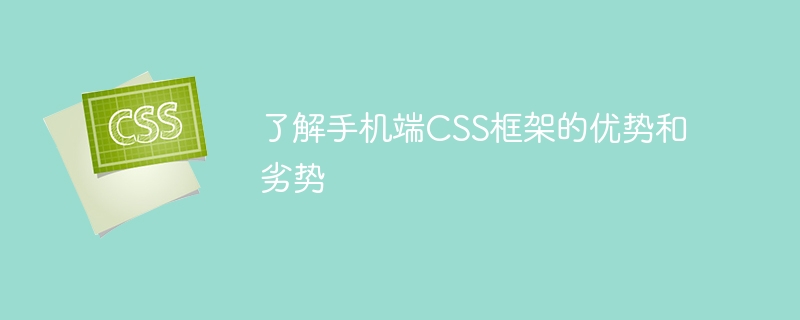
Understand the advantages and disadvantages of mobile CSS framework
With the popularity of mobile devices and the development of the mobile Internet, mobile phones have become an indispensable part of people's lives. . When developing mobile web pages, using the CSS framework can help us quickly build interfaces that adapt to different devices, improving development efficiency and user experience. However, CSS frameworks also have some disadvantages. This article will analyze the advantages and disadvantages of mobile CSS frameworks.
First, let’s take a look at the advantages of the mobile CSS framework.
- Improve development efficiency: The mobile CSS framework provides a wealth of styles and components that developers can use directly without having to write and debug CSS code themselves. This saves development time and effort and improves development efficiency.
- Cross-device adaptation: Mobile devices of different models, sizes and resolutions are different, and developers need to spend a lot of time and energy to adapt the interfaces of different devices. The mobile CSS framework takes into account the characteristics of different devices and uses responsive design and adaptive layout to quickly adapt to different devices and provide a consistent user experience.
- Provide UI components and interactive effects: The mobile CSS framework has built-in many commonly used UI components and interactive effects, such as buttons, menus, carousels, etc. Developers only need to make simple calls to implement these functions . This not only reduces development difficulty, but also improves the consistency and aesthetics of the user interface.
However, the mobile CSS framework also has some disadvantages.
- Learning cost: To use the mobile CSS framework, developers need to learn and master how to use the framework. Some frameworks may have complex APIs and documents, and the learning cost may be high for beginners, requiring a certain amount of time and effort.
- Restraint: Mobile CSS frameworks usually have a set of specifications and standards, and developers need to develop in accordance with the framework's specifications. On the one hand, this limits the freedom and creativity of developers. On the other hand, it may also cause all interfaces developed based on this framework to have similar styles and lack personalization.
- File size: Some commonly used mobile CSS framework files are relatively large. If multiple frameworks are used in a project, the time to download and load these frameworks will increase, affecting the loading speed and user experience of the web page. .
In general, the advantages of the mobile CSS framework lie in improving development efficiency, cross-device adaptation and providing rich UI components and interactive effects, while the disadvantages are reflected in learning costs, constraints and File size, etc. Therefore, when selecting and using a mobile CSS framework, you need to weigh and choose based on the needs of the specific project and the developer's technical level. At the same time, you also need to flexibly use the CSS framework to create a unique user interface based on your own needs and creativity.
The above is the detailed content of Explore the advantages and disadvantages of mobile CSS frameworks. For more information, please follow other related articles on the PHP Chinese website!






